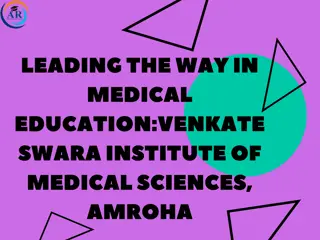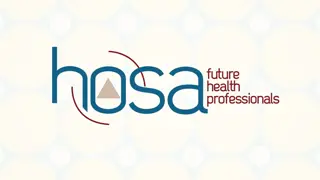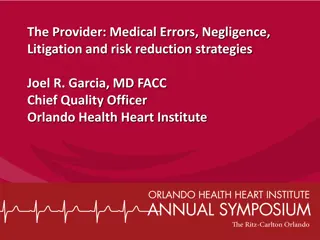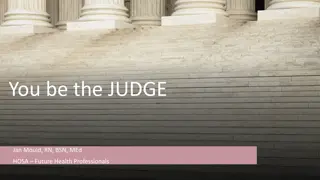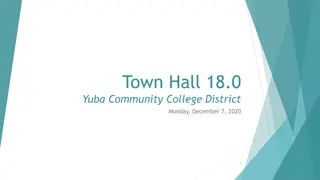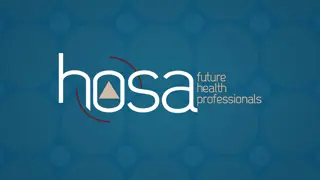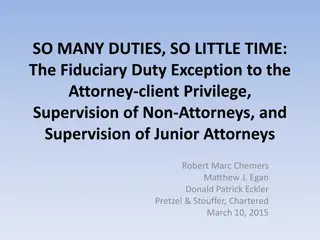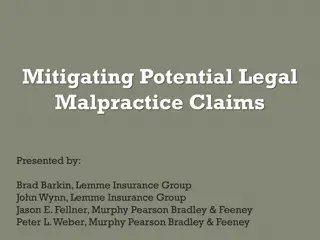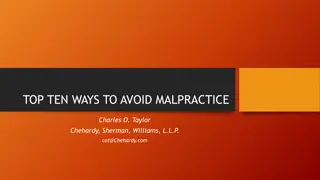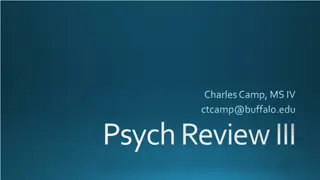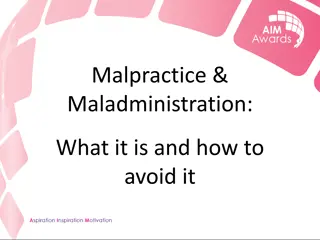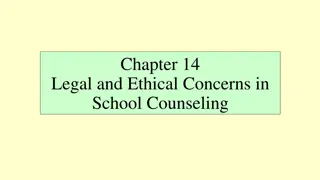Latest Updates on Medical Malpractice Law
Annual Medical Malpractice seminar providing updates on recent legal cases related to arbitration agreements in healthcare settings. The seminar highlighted cases involving minors' rights in arbitration agreements, decedents not bound to arbitration, and nursing homes failing to prove authority to bind residents. The session emphasized the importance of agency in arbitration agreements and the need for valid power of attorney.
Download Presentation

Please find below an Image/Link to download the presentation.
The content on the website is provided AS IS for your information and personal use only. It may not be sold, licensed, or shared on other websites without obtaining consent from the author. Download presentation by click this link. If you encounter any issues during the download, it is possible that the publisher has removed the file from their server.
E N D
Presentation Transcript
2023 Annual Medical Malpractice seminar Update of the law Update of the law November 29, 2023 November 29, 2023 Presented by: Clifford A. Rieders Rieders, Travis, Dohrmann, Mowrey, Humphrey & Waters 161 West Third Street Williamsport, PA 17701 (570) 323-8711 crieders@riederstravis.com www.riederstravis.com
ARBITRATION ARBITRATION 2
Santiago v. Philly Trampoline Park 2023 Pa. Super. LEXIS 110 (March 21, 2023) Bowes, J. A parent, as natural guardian, may not bind a minor child to an arbitration agreement and waive that child s right to seek redress for injuries in a court of law. Superior Court affirmed the lower court in saying that the parents cannot bind their minor children to arbitration. Sky Zone failed to meet its burden to show that the signatory spouses were the agents of the non-signing spouses. Parent-child relationship did not empower signatory parents to waive their minor children s rights to have their claims resolved in a court of law. 3
Kohlman v. Grane Healthcare 2022 Pa. Super. LEXIS 296 (July 5, 2022) Colins, J. Decedent not bound to arbitration by nursing home. She was taking Xanax and other medications at the time. She did not have an opportunity to consult with friends or family. This was both procedurally and substantively unconscionable. Terms of arbitration imposed on decedent were unfavorable to her without giving her any meaningful choice to accept or reject the arbitration agreement. No abuse of discretion by trial court and its order overruling Highland s POs was sustained. 4
Adams v. Mt. Leb. Operations, LLC 2022 Pa. Super. LEXIS 236 (May 27, 2022) Murray, J. Nursing home unsuccessful in proving that resident s supposed power of attorney had any authority to bind the decedent to an arbitration agreement. At most here, there was general awareness of power of attorney. There must be agency to bind the decedent. Manor Care had a duty to ascertain the nature and extent of the written power of attorney. The law required Manor Care to determine that there was a valid power of attorney for the arbitration agreement to be effective. 5
Damages Damages 6
Cowher v. Kodali 2022 Pa. LEXIS 1408 (S. Ct. September 29, 2022) Dougherty, J. Medical malpractice action. Lump sum awarded under Survival Act. Jury did not itemize amount of pain and suffering damages or other components of its aggregate award. Question here is one of waiver. Defendants filed in the trial court a proposed verdict slip for the jury which did not itemize and simply had wrongful death and survival separately. Pain and suffering testimony was from an expert for plaintiff who said he believed that decedent suffered conscious pain and suffering. Defendants declined the court s offer to review the verdict slip, but requested the jury be polled. Defendants did not ask the trial court to require the jury to itemize or otherwise clarify its verdict. 7
Cowher v. Kodali 2022 Pa. LEXIS 1408 (S. Ct. September 29, 2022) Dougherty, J. Defendants alleged that SJIC form calls for damages under Wrongful Death and Survival Act to be awarded in two lump sum amounts, and they were stuck with that. Defendants alleged that the Supreme Court required wrongful death and survival awards to be rendered in lump sum awards. Court says that is not correct. When a litigant fails to request a special verdict slip that would have clarified the basis for a general verdict, and the verdict rests upon valid grounds, the right to a new trial is waived. Court says it does not matter that the expert testimony on pain and suffering may have been slim since there were other components of the Survival Act the jury could have considered. General verdict under the Survival Act is supported by other valid evidence. Defendants knew prior to trial that the propriety of plaintiff s pain and suffering testimony was a possible appellate issue, but declined to take advantage of the multiple opportunities to request a special verdict slip. Defendants at this point post-verdict had no right to complain. 8
Discovery Discovery 9
Leadbitter v. Keystone Anethesia Consultants 2021 Pa. LEXIS 3398 (August 17, 2021) Saylor, J. Information redacted by the hospital and documents withheld are not discoverable by plaintiffs if they constitute peer review proceedings or records . 63 P.S. 425.4. Record review did not include the documents. Court of Common Pleas will conduct in camera determination. Definition of peer review should be framed in terms of professional health care providers , which in turn is limited to individuals or organizations who are approved, licensed, or otherwise regulated to practice or operate in the health care field under Pennsylvania law.See 63 P.S. 425.2, definitions of peer review and professional health care provider . Above definition should be utilized by the county court on remand. NPDB query responses should not be produced as that is governed by federal law. This protection exists regardless of any state law. 10
Betz v. UPMC Pinnacle W. Shore Hosp. 2023 Pa. Super. LEXIS 401 (September 14, 2023) Bowes, J. Question is whether whistleblower who reports on hospital misconduct or negligence must be identified in a personal injury action. Answer the Court gave was yes . Evidentiary privileges are disfavored. Use should be permitted only in very limited circumstances relevant to public good. Author of anonymous report is not to be kept from parties in negligence litigation. Employers may not terminate or otherwise discriminate against a whistleblower. Hospital stands in the shoes of an employer but not an appropriate authority under MCARE. Hospital is not an appropriate authority prohibited from disclosing identity of the author of an anonymous report. Whistleblower law in the MCARE Act makes plain that the hospital does not stand in the shoes of an appropriate authority that is bound to protect the identity of a whistleblower. 11
Betz v. UPMC Pinnacle W. Shore Hosp. 2023 Pa. Super. LEXIS 401 (September 14, 2023) Bowes, J. Rather, the appropriate authority or public entity is involved in administering the Act, namely the Patient Safety Authority and the Department of Health. Hospital is the employer for purposes of the Act. 1303.308, which requires health care workers to make reports of serious events and incidents, makes no reference to anonymous reporting. MCARE Act, on its face, contemplates that medical facilities will be aware of who makes reports pursuant to the patient safety plan. MCARE Act itself merely states generally that a worker who reports an incident or serious event shall not be subject to retaliatory action. Court held that 40 P.S. 1303.308(b) and 43 P.S. 1423(c) do not preclude the hospital from taking reasonable efforts to ascertain and disclose to plaintiff the author of the anonymous report. 12
Ford-Bey v. Profl Anethesia Servs. 2023 Pa. Super. LEXIS 398 (September 12, 2023) Sullivan, J. Lisa Gill, who holds several titles at hospital, conducted a root cause analysis to determine cause of Ms. Ford-Bey s decline. Trial court ordered the hospital to produce the notes of Lisa Gill. Section 311 of MCARE Act indicates that documents, materials or information solely prepared or created for the purpose of compliance with the Act which arise out of matters reviewed by the patient safety committee pursuant to the Act are confidential and shall not be discoverable. This applies only to documents, materials or information prepared or created pursuant to the responsibilities of the patient safety committee or governing board of a medical facility. MCARE requires hospital to have a patient safety plan that designates facility s patient safety officer and establishes a patient safety committee . Patient safety committee is to consider matters which arise out of concerns reviewed by the patient safety committee pursuant to Section 310(b) or the governing board of a medical facility. 13
Ford-Bey v. Profl Anethesia Servs. 2023 Pa. Super. LEXIS 398 (September 12, 2023) Sullivan, J. For the hospital to assert a privilege under Section 311(a) it must bear the burden of demonstrating that Gill s notes were exclusively prepared or created to comply with MCARE. Hospital failed to produce evidence demonstrating Gill solely prepared or created her notes for the purpose of complying with MCARE. To the extent the hospital relied on its Sentinel Events Policy, the policy emanated from a Kansas corporation. Hospital CEO and corporate designee offered only equivocal testimony that Gill held several corporate titles and was possibly the hospital s designated MCARE patient safety officer. Hospital cannot demonstrate that Gill solely prepared or created her notes during the root cause analysis to comply with MCARE. Hospital did not meet its burden of invoking the privilege set forth in Section 311 of MCARE. 14
Sanders v. Childrens Hosp. of Phila 2022 Pa. Super. LEXIS 462 (November 22, 2022) Bowes, J. Infants died after contracting adenovirus in CHOP s Neonatal Intensive Care Unit. Twenty-three (23) infants contracted the virus. Dr. Sammons discovered that the common event experienced by all infected babies was a retinopathy of prematurity eye examination. Handheld lens and indirect ophthalmoscope that never came in contact with the patients, revealed the presence of the adenovirus. Dr. Sammons concluded the virus was transmitted to each of the patients by the doctor touching the contaminated equipment and then touching the babies. Dr. Sammons performed the investigation. Court goes through all the various meetings and investigation and the documents produced. Evidentiary privileges are disfavored. 15
Sanders v. Childrens Hosp. of Phila 2022 Pa. Super. LEXIS 462 (November 22, 2022) Bowes, J. Patient Safety Committee under the Mcare Act includes members of community that are not professional health care providers, and therefore the Patient Safety Committee cannot constitute peer review committee whose proceedings are protected by PRPA. Mcare Act, however, contains a separate confidentiality provision. To be privileged under the Mcare Act, the materials must (1) be solely prepared for compliance with an enumerated Mcare Act duty, and (2) arise out of matters reviewed by the Patient Safety Committee in accordance with 310(b), and (3) not be otherwise available from original sources. Root Cause Analysis Report. Court said it was prepared solely for Mcare use and arose out of matters that were reviewed by Patient Safety Committee and thus Court reversed that portion of the trial court s order directing CHOP to produce the root cause analysis. PowerPoint slides. PowerPoint slides prepared following completion of the investigation are confidential. Therefore, trial court was reversed insofar as it required CHOP to produce documents. PowerPoint slides prepared for other conferences held at CHOP and Grand Rounds Conference also do not have to be produced. 16
Sanders v. Childrens Hosp. of Phila. 2022 Pa. Super. LEXIS 462 (November 22, 2022) Bowes, J. PowerPoint slides and minutes from IP&C Committee meetings. The court said that those documents did not have to be produced. PowerPoint slides from the Patient Safety Committee meeting on September 22, 2016. The trial court reversed to the extent that it ordered production of these documents. Internet postings to CHOP personnel about the outbreak. CHOP failed to establish that the trial court committed error of law in ordering production of the intranet posts. Redacted ophthalmology emails. CHOP failed to meet burden of establishing these emails were privileged. Court said it understood the conflict between civil plaintiffs trying to get information and secrecy, allegedly creating a greater environment to talk about negligence within the institution. 17
Williams v. Geo Group 2022 Pa. Super. LEXIS 365 (August 24, 2022) McLaughlin, J. Prison suicide. Report about the suicide prepared. Prison system refused to give the report, claiming peer review and attorney-client. Court reviewed the Peer Review Protection Act, 63 P.S. 425.1- 425.4. GEO contends it constitutes professional health care provider because it operates a prison. Court looked at the Act dealing with confidentiality of review organization s records, 425.4 of the PRPA. This was not a review organization as that is defined by law. Court relied upon the Supreme Court s discussion of the PRPA in Leadbitter, 256 A.3d at 1168-69. Trial court found the report was not prepared as a function of peer review and therefore was not privileged. Superior Court concurred. 18
Williams v. Geo Group 2022 Pa. Super. LEXIS 365 (August 24, 2022) McLaughlin, J. Even the affidavit of the report s contributing author alluded to the fact that the report was generated by review of various materials, both medical and non-medical as a follow-up of a request for preservation of evidence in anticipation of potential litigation. Report was for self-policing of medical professionals. Trial court did not err by finding that the PRPA did not preclude discovery of the report in this case. Court also found that the report was not privileged under Pennsylvania Rule of Civil Procedure 4003.5. The fact that the report was authored by a doctor is irrelevant. Dr. Hermann and the rest of the contributors to the report were acting in their regular course of employment with GEO. They did not qualify as experts or specially retained as experts. Report which GEO asserts primarily concerns mental health care is not relevant to the cause of action filed here. 19
Statute of Limitations Statute of Limitations 20
Reibenstein v. Barax 286 A.3d 222 (Pa. 2022) Wecht, J. Plaintiff did not know until the deposition of doctor Barax that Dr. Conaboy had been notified of an abdominal aortic aneurysm and did not do anything about it. Court clearly was not happy about the fact that it took five years to depose this doctor. Court went further and said that tolling is different in a death case than an injury case. Court also looked to Bureau of Vital Statistics definitions concerning what is on death certificate. Discovery rule applies when critical information about an injury eludes detection through no lack of diligence on plaintiff s part, and discovery of that information dictates that a claim accrues, and the limitations period begins to run. When potential malpractice leads to death, there is no question that injury has occurred and there is a duty to investigate the prospect of malpractice diligently. 21
Reibenstein v. Barax 286 A.3d 222 (Pa. 2022) Wecht, J. Discovery rule and equitable tolling are conceptually distinct. A discovery rule claim only accrues upon discovery of the injury and its cause, while the equivalent of accrual in death cases happens upon death. Statute of limitations will be tolled when the cause of death is obscured by some affirmative act or omission that lulled the plaintiff into neglecting the duty to investigate to determine whether there was an actionable claim in malpractice. Discovery rule begins to run upon discovery of injury and the prospect that it was caused by malpractice, not whose malpractice. 22
Reibenstein v. Barax 286 A.3d 222 (Pa. 2022) Wecht, J. Once the claim accrues, the clock begins to tick. It does not matter how difficult it is to trace the injury back to a tortious act. Statute of limitations begins to run at the latest, once an injury is discovered, its cause and the agent of the harm. There is no assurance that some additional reprieve will apply during the course of litigation because a second potentially liable party enters the picture. This may cause the plaintiff to begin suit against a bevy of health care providers; however, that is not likely to be a threat because of the certificate of merit requirement. Plaintiff was unable to obtain a certificate of merit against Dr. Conaboy early in the litigation. 23
Reibenstein v. Barax 286 A.3d 222 (Pa. 2022) Wecht, J. There is a rule permitting discovery in furtherance of preparing a complaint, a mechanism that Reibenstein did not explore. Reibenstein would have the Court believe that she never had any chance of identifying Conaboy as a proper defendant, but the Court obviously disagreed with that. The phrase cause of death as used in the Mcare Act 513(d), refers specifically to the medical cause of death. Only an affirmative misrepresentation or fraudulent concealment of such medical cause of death will toll the two-year statute of limitations that Mcare prescribed for medical malpractice sounding in survival or wrongful death. 24
Edwards v. Norfolk S. Ry. Co. 2023 Pa. Super. LEXIS 109 (March 21, 2023) Pellegrini, J. When a plaintiff timely files an action on behalf of an estate but does not apply to be appointed the personal representative until after the statute of limitations has run, the relation back doctrine applies. Statute of limitations is preserved by the filing of the complaint, even though the personal representative was not appointed until after the expiration of the statute of limitations. Superior Court affirmed and held that appointment as personal representative of estate relates back to the time of the filing of the complaint. 25
Didomizio v. Jefferson Pulmonary Asso. & Asthma, Allergy & Pulmonary Asso., P.C. 2022 Pa. Super. LEXIS 323 (August 2, 2022) Pellegrini, J. Superior Court reversed Common Pleas Court in throwing out case due to statute of limitations. August 15, 2017, Didomizio commenced medical malpractice action against defendants. Plaintiff maintains it was not until she sought a second opinion at HUP in 2016 regarding her lung cancer treatment that she had reason to question her sarcoidosis diagnosis. Hospital defendant said that an ordinarily reasonable person who was diagnosed with lung cancer on or before July 21, 2015, after allegedly experiencing signs and symptoms of cancer earlier, possessed sufficient critical facts to put her on notice to make inquiry of possible misdiagnosis. 26
Didomizio v. Jefferson Pulmonary Asso. & Asthma, Allergy & Pulmonary Asso., P.C. 2022 Pa. Super. LEXIS 323 (August 2, 2022) Pellegrini, J. Defendant claims action was not filed until August 15, 2017, more than two (2) years after plaintiff was placed on inquiry notice. It is undisputed that Didomizio knew as of 2015 that she had cancer. It is not clear from her progress notes if the doctor believed that the sarcoidosis diagnosis was wrong and delayed the cancer diagnosis or whether it was an additional diagnosis that might or might not have been correct. Because of the uncertainty, this case is similar to Nicolaou v. Martin, 195 A.3d 880 (2019). It is up to a jury to determine. 27
Knapp v. United States 2022 U.S. App. LEXIS 23851 (3rd Cir. August 25, 2022) Greenaway, C.J. Westfall Act permits a person to file a Federal Tort Claims Act if they filed in the wrong forum, so long as they file in the correct place within 60 days of the dismissal. This also applies where the wrong agency is served and the correct agency substituted. Here, the case was dismissed three (3) times and nothing was filed within the 60-day requirement. Therefore, the case is dismissed. 28
Shefcyk v. Temple Univ. Hosp., Inc. 2023 U.S. Dist. LEXIS 34653 (E.D. Pa. March 2, 2023) Goldberg, J. Whether statute of limitations should be tolled because plaintiff did not know the doctor involved would be deemed a federal employee. Unlike the plaintiffs in Santos v. United States, 559 F.3d 189 (3d Cir. 2009) and Young v. Temple, 2019 U.S. Dist. LEXIS 186711 (E.D. Pa. October 28, 2019), there is no indication that plaintiff acted with the diligence required to involve equitable tolling. Assuming that plaintiff justifiably believed that Dr. Su was a Temple employee, plaintiff would have had two years under Pennsylvania law to commence a malpractice action. Yet, plaintiff did not bring an action against any of the defendants until more than three years after the alleged malpractice occurred, making it untimely at the outset. Following removal to federal court, the parties stipulated to a stay of the case while plaintiff attempted to exhaust administrative remedies. During the pendency of that more than six months stay, during which plaintiff was aware of the United States argument that any action against it would be time-barred, plaintiff failed to gather any evidence or prepare any sworn document regarding the purportedly diligent investigation taken prior to filing suit. 29
Fair Share Act Fair Share Act 30
Spencer v. Johnson 2021 Pa. Super. LEXIS 144 (March 18, 2021) Panella, P.J. The Fair Share Act requiring 60% of liability in order for joint and several liability to apply is not utilized where there is no negligence on the part of the plaintiff. In this case, the plaintiff was not found to be negligent and there was vicarious liability with the deep pocket in connection with the use of the car that injured the plaintiff. The Fair Share Act simply does not apply in a situation where there is vicarious liability and there is no negligence on the part of the plaintiff. Therefore, the court improperly applied delay damages. 31
Spencer v. Johnson 2021 Pa. Super. LEXIS 144 (March 18, 2021) Panella, P.J. Pennsylvania Motor Vehicle Code 1574 imputes joint and several liability on someone who commits a 1574 violation. This is a section that imputes liability where a car is given to a driver who is unlicensed. The jury s general verdict necessitated a finding that owner of the vehicle, PJB, was vicariously liable for driver s negligence and therefore joint and several liability applied pursuant to the Fair Share Act. It would be redundant to decide whether the imputation of joint and several liability in 1574 applied to the present matter. 32
Evidence Evidence 33
Lageman v. Zepp 2021 Pa. LEXIS 4314 (S. Ct. December 22, 2021) Wecht, J. Both experts acknowledge association between arterial cannulation and stroke. Plaintiff had a qualified and credible expert who testified in no uncertain terms that stroke ordinarily could not happen without negligence on the part of provider. Expert s testimony, by itself, comprises prima facie evidence as to that proposition. Defense acknowledge that arterial cannulation has been associated with stroke because of potential penetration of air, fluids or medications entering the artery or due to creation of blood clot or dislodgement of arterial plaque which then travels to the brain. Careful testimony can avoid these complications. Trial court must yield to jury as soon as plaintiff makes a threshold showing. Both experts acknowledged the association between arterial cannulation and stroke. Would the result have been different if the experts did not agree on that? 34
Lageman v. Zepp 2021 Pa. LEXIS 4314 (S. Ct. December 22, 2021) Wecht, J. Whether instruction is warranted hinges entirely upon whether plaintiff has made a prima facie showing as to Section 328D factors, not whether defense has a credible counter-narrative where plaintiff has made out a plausible basis for recovery without resort to doctrine. Restatement (Second) of Torts Section 328D provides that it may be inferred that the harm suffered was caused by negligence when: Event is of the kind which ordinarily does not occur in the absence of negligence; Other responsible causes, including the conduct of plaintiff and third persons are sufficiently eliminated by the evidence; and Indicated negligence is within scope of the defendant s duty to the plaintiff. It is the function of the court to determine whether inference may reasonably be drawn by the jury or whether it must necessarily be drawn. It is the function of the jury to determine whether inference is to be drawn in any case where different conclusions may reasonably be reached. Superior Court sustained and matter was properly remanded for new trial because the trial court did not charge on res ipsa loquitur. 35
Mertis v. Dong-Joon Oh 2022 Pa. Super. LEXIS 322 (August 2, 2022) Pellegrini, J. Superior Court reversed trial court, which refused to give relief. Law firm lawyer had ex parte communication with treating physician who was not a party pursuant to Rule 4003.6. Doctor had requested that the lawyer represent him. There were many conversations. Dr. Kim had sought representation of the lawyer in response to a subpoena he received. Doctor was a treating physician. Lawyer should not have spoken with him. Case will be remanded for relief, not necessarily disqualification of the law firm, however. 36
Prep Act Prep Act 37
Maglioli v. Alliance 16 F.4th 393 (3d. Cir. 2021) Porter, C.J. Two New Jersey nursing home residents died from COVID-19. Estates claim that the nursing homes acted negligently in handling the COVID-19 pandemic causing deaths. Estates commence negligence and wrongful death lawsuits in State Court. Nursing homes rmoved to Federal Court. District Court dismissed the cases for lack of subject-matter jurisdiction and remanded them to state court. District Court s order dismissing cases for lack of jurisdiction affirmed. Congress passed the Public Readiness and Emergency Preparedness Act ( PREP Act ). PREP Act protects certain individuals such as pharmacies and drug manufacturers from lawsuits during a public-health emergency. When the Secretary makes a declaration in the Federal Registry of a health threat, covered individuals become immune from suit and liability from claims related to administration of a covered countermeasure. 38
Maglioli v. Alliance 16 F.4th 393 (3d. Cir. 2021) Porter, C.J. In March of 2020, Secretary issued a declaration under the PREP Act that COVID-19 is a public-health emergency. The scope of the immunity is broad. The Act established a fund to compensate eligible individuals for covered injuries caused by the administration or use of a covered countermeasure. There is one exception to the statutory immunity. PREP Act provides exclusive Federal cause of action against a covered person for death or serious physical injury proximately caused by willful misconduct. Even assuming that nursing homes are subject to intense regulations, that does not mean they were Acting under federal officers. PREP Act is not so pervasive that the estates state-law negligence claims are preempted as federal claims. Congress has said that cause of action for willful misconduct is exclusive and that is the only action that is preempted. 39
Maglioli v. Alliance 16 F.4th 393 (3d. Cir. 2021) Porter, C.J. Just because the PREP Act creates an exclusive cause of action for willful misconduct, does not mean it completely preempts the estates state-law claims. A claim for willful misconduct on under the PREP Act has the following elements: 1. An act or omission that is taken 2. Intentionally to achieve a wrongful purpose 3. Knowingly without legal or factual justification 4. In disregard of a known or obvious risk that is so great as to make it highly probable that the harm will outweigh the benefits. 5. The act must be against a covered person 6. For death or serious physical injury 7. Proximately caused by willful misconduct Plaintiff s MUST prove with clear and convincing evidence. The standard for liability is more stringent than the standard of negligence in any form of recklessness. The estates alleged recklessness but not willful misconduct. 40
Maglioli v. Alliance 16 F.4th 393 (3d. Cir. 2021) Porter, C.J. Even the punitive damage language of the estates does not suggest that the nursing homes acted with intent to achieve a wrongful purpose with knowledge and through actions. The nursing home s argument that the PREP Act compensation fund itself completely preempts the estates negligence claim is even less plausible. We do not hold that all state-law cause of action are invulnerable to complete under the PREP Act. Conceivably, some state-law claims could fall within Congress s narrow cause of action for willful misconduct. State court to determine on a remand if there is preemption. 41
Risks and Complications Risks and Complications 42
Brewer v. Campbell Pa. No. 19-0505 (C.P. Lycoming 2021) Lindhart, J. The court in Brewer noted as follows: The Supreme Court first clarified that pursuant to its prior decision in Brady v. Urbas, Evidence of the risks and complications of a surgical procedure, in the form of either testimony or a list of such risks as they appear on an informed- consent sheet could be relefant in establishing the standard of care. Quoting Brady, A3d at 1162 The Supreme Court found that the trial court had been correct in determining that the expert s discussion of risks and complications, and specifically that a perforation of the colon was a known risk that could occur absent negligence, was relevant and admissible as to applicable standard of care. 43
Brewer v. Campbell Pa. No. 19-0505 (C.P. Lycoming 2021) Lindhart, J. Court would not bar Dr. Campbell from testifying as to known risks and complications without knowing the content of his intended testimony. If such testimony is relevant to defining the standard of care, it will be admissible. Court will not construe, to the detriment of defendants, plaintiff s failure to interrogate Dr. Campbell as to his expert opinion in discovery. Plaintiff s counsel said that he did not interrogate the doctor, because he did not want to open up the door to those opinions. Plaintiff is not pursing informed consent claim. Court did not inquire as to specifically what those risk and complications were and whether they satisfied the standard of reasonable scientific certainty. 44
Mental Health procedure Mental Health procedure act act 45
Matos v. Geisinger Med. Ctr. 2023 Pa. Super. LEXIS 90 (March 10, 2023) Stabile, J. Trial court refused to grant summary judgment to hospital. Steven Matos, Administrator of the Estate of Jessica Frederick, brought a claim against Geisinger under the Mental Health Procedures Act. Westley Wise had a history of acute psychiatric issues. He submitted himself for voluntary inpatient examination and treatment for Geisinger. He was denied his request for treatment. Wise had murdered his girlfriend the same day that treatment was refused. Matos alleged that Geisinger and Alley were liable for gross negligence and willful misconduct because of the denial of treatment. Facilities such as Geisinger and Alley may be held liable for refusal to provide voluntary inpatient examination and treatment to a person who submits himself for examination and treatment when the refusal constitutes willful misconduct or gross negligence even if there was not a written application. 46
Federal Tort Claims Act Federal Tort Claims Act 47
Wilson v. United States 2023 U.S App. LEXIS 21864 (August 21, 2023) Chagares, C.J. Pro se inmate sued under Federal Tort Claims Act for medical negligence. In a Federal Tort Claims Act matter, there is no requirement to comply with Pennsylvania Rule of Civil Procedure 1042.3 concerning certificates of merit. Although this is substantive law, it does not apply. Grant of summary judgment reversed. We hold that Rule 1042.3 s certificate of merit requirement does not apply in Federal Tort Claims Act cases. FTCA s incorporation of state law is limited in scope. Court basically seems to believe this is a procedural and not a substantive rule. Just because a state rule of civil procedure is outcome determinative does not necessarily mean that it informs the state law merits-based liability determination as required for FTCA incorporation. 48
Duty Duty 49
Sinoracki v. Childrens Serv. Ctr. Of Wyo. Valley 2023 Pa. Super. LEXIS 411 (September 19, 2023) Murray, J. Z.H. was diagnosed with inoperable AVM in brain and was a very dangerous person. Eventually, Z.H. stabbed somebody. The crux is whether defendants owed a duty to the family of the killed person, the Sinoracki family. Under Pennsylvania law, when a physician voluntarily undertakes to act within the doctor/patient relationship for the protection of a non-patient third party, the physician assumes a duty of reasonable care to the third party who is within the orbit of danger. Court distinguishes this case from others and points out that here the doctor and the family involved are not liable. Appellant failed to establish that defendants owed the Sinoracki family a duty of care. No duty to control the conduct of a third party to protect another from harm. Mental health patients do not have a disease communicable to the public and they are not a pre-existing peculiar threat to the public. The communicable disease cases do not apply. 50




